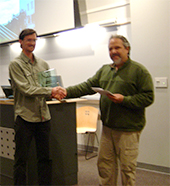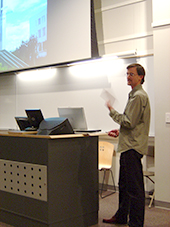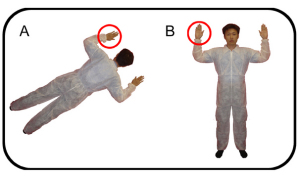|
 |
Hollon wins APA Div. 12 award
Steve Hollon has won the Award for Distinguished Scientific Contributions to Clinical Psychology from the Society of Clinical Psychology (APA Division 12). Congratulations to Steve for this well-deserved recognition for his body of work on cognitive therapy for depression.
APA Division 12 Awards Website
December 29, 2009 |
 |
Vanderbilt ranked 15th in publications in Psychological Science
Vanderbilt is ranked 15th in the world for publications in Psychological Science over the past 10 years. Psychological Science is the flagship journal of the American Psychological Society and is considered one of the premier journals in all of Psychology.
Full Story
December 15, 2009 |


 |
SPECIAL TALK
Thursday 11/12/09
2009 “Randolph Blake Early Career Award” Winner
David Lyon, Ph.D
Assistant Professor
University of California, at Irvine
Circuits mediating surround suppression in primary visual cortex
Extraclassical surround (ECS) stimuli provide a spatial context that modulates classical receptive field (CRF) responses of cells in early visual cortex and is thought to play a key role in figure ground segmentation and form vision. In our recent experiments we combined optical imaging and single-unit recording in cat V1 to determine whether the ECS is affected by neural circuits mediating orientation maps. We find that ECS suppression of neurons located within domains is better tuned to the preferred orientation of the CRF, whereas cells near fracture sites, such as pinwheels, exhibit comparatively weaker suppression. Furthermore, when we remove the near component of the surround, thought to be mediated through long-range intrinsic connections, the strength of iso-orientation suppression of domain cells is reduced making them indistinguishable from pinwheel neurons. Our results suggest that ECS tuning depends not only on position in the V1 orientation map, but on intrinsic connections between like-oriented domains. Future work in the lab is aimed at directly correlating ECS tuning of domain and pinwheel neurons to long-range lateral inputs by a novel method for tracing the anatomical inputs to a single neuron.
Thursday, November 12, 2009
103 Wilson Hall
4:10 PM
November 6, 2009 |
 |
Professor's work is at intersection of education and neuroscience
How does the brain change during learning? What individual differences in brain circuitry make it harder for some kids to learn certain skills?
Bruce McCandliss, a developmental cognitive neuroscientist, asks these questions in his lectures and in conversations with graduate students and teachers. Exploring how differences in individual children’s brains impact learning – and how education in turn shapes brain development – are issues that drive his research.
“Some of the principles and findings from systems-level neuroscience are starting to provide insights that speak to these questions and help us understand individual differences and educational interventions in new ways,” he said.
Full Story
October 29, 2009 |
 |
2009 Fine Science Tool Travel Award
Congratulations to Ayan Ghoshal, David Godlove and Jamie Reed for being selected to receive the 2009 Fine Science Tool Travel Award. This award provides $500 towards the cost of attending the Society for Neuroscience meeting in Chicago.
October 6, 2009 |
|
|
Olatunji wins ABCT President's New Researcher Award
Bunmi Olatunji won the President's New Researcher Award from the Association for Behavioral and Cognitive Therapy (ABCT). Last year he won an Early Career Award from ABCT from the Anxiety Disorders Special Interest Group. This award is ABCT-wide and a testimony to the broad influence of Bunmi's work. Congratuations, Bunmi, on a great and well-deserved honor.
September 29, 2009 |
|
|
Art Makes Place event at Frist to feature panel of VU experts
Four distinguished scholars from Vanderbilt will participate on a panel debating the ethics of healthy people taking prescription drugs to enhance brain power. The panel is the seventh and final project of the year-long program "Art Makes Place" and will take place on Thursday, Sept. 17, 6:30 - 7:30 p.m., at the Frist Center for the Visual Arts. Art Makes Place is contemporary artists making community-oriented, temporary and performance-based art for public spaces, or AMP.
CICN Investigator on the Vanderbilt panelists include, Associate Professor of Law and Philosophy, Nita A. Farahany, focuses on the legal, philosophical, and social issues arising from biosciences, particularly related to behavioral genetics and neuroscience.
Full Story
September 14, 2009 |
|
|
2009 Fall Faculty Assembly Awards
At this years Fall Faculty Assembly, Gordon Logan, Tom Palmeri, and Jeff Schall were awarded a Chancellor's Award for Research for the theoretical and empirical work summarized in their wonderful 2007 Psychological Review paper. Their research has combined behavioral, electrophysiological, and computational methods to test and refine alternative models of the inhibitory control processes that are recruited during the stop-signal paradigm. It is very important to acknowledge additionally Leanne Boucher, who clearly has played a very central role in this line of work. Congratulations to all of them for their outstanding work!
Full Story
September 2, 2009 |
 |
Worth the effort? Not if you're depressed
New research indicates that decreased cravings for pleasure may be at the root of a core symptom of major depressive disorder. The research is in contrast to the long-held notion that those suffering from depression lack the ability to enjoy rewards, rather than the desire to seek them.
The research, led by Vanderbilt psychologists Michael Treadway and David Zald, was published Aug. 12 by the online journal PLoS One.
“This initial study shows that decreased reward processing, which is a core symptom of depression, is specifically related to a reduced willingness to work for a reward,” Treadway, a graduate student in psychology, said.
Full Story
August 18, 2009 |
|
|
Ability to literally imagine oneself in another's shoes may be tied to empathy
New research from Vanderbilt University indicates the way our brain handles how we move through space—including being able to imagine literally stepping into someone else’s shoes—may be related to how and why we experience empathy toward others.
The research was recently published in the online scientific journal PLoS ONE. The full article is available at: http://tinyurl.com/lw6qmv.
Empathy involves, in part, the ability to simulate the internal states of others. The authors hypothesized that our ability to manipulate, rotate and simulate mental representations of the physical world, including our own bodies, would contribute significantly to our ability to empathize.
“Our language is full of spatial metaphors, particularly when we attempt to explain or understand how other people think or feel. We often talk about putting ourselves in others’ shoes, seeing something from someone else’s point of view, or figuratively looking over someone’s shoulder,” Sohee Park, report co-author and professor of psychology, said. “Although future work is needed to elucidate the nature of the relationship between empathy, spatial abilities and their potentially overlapping neural underpinnings, this work provides initial evidence that empathy might be, in part, spatially represented.”
Full Story
June 24, 2009 |
|
|
2009 Elaine Sanders-Bush Neuroscience Research Prize
Congratulations to Josh Buckholtz for receiving this years Elaine Sanders-Bush Neuroscience Research Prize. Josh will receive the award certificate and a cash prize at this years retreat. The award recognizes an outstanding paper published by a Vanderbilt Neuroscience Program graduate student in the past year.
Congratulations to Josh!
June 8, 2009 |
|
|
Rising Stars
Congratulations to Chai-Youn Kim. She has been selected as a "Rising Star" from the Association for Psychological Science.
The Association for Psychological Science has presented another installment of "Rising Stars," a series profiling exemplars of today's young psychological researchers. This month and next month they are profiling international scholars who, although they may not be advanced in years, have already made great advancements in science. Chai-Youn, former graduate student and postdoc in Randolph Blake's Lab, was selected as a Rising Star. Her interview can be read here.
April 6, 2009 |
 |
Robot playmates monitor emotional state of children with autism
The day that robot playmates help children with autism learn the social skills that they naturally lack has come a step closer with the development of a system that allows a robot to monitor a child’s emotional state.
“There is a lot of research going on around the world today trying to use robots to treat children with autism spectrum disorders (ASD). It has shown that the children are attracted to robots, raising the promise that appropriately designed robots could play an important role in their treatment,” says Nilanjan Sarkar, associate professor of mechanical engineering at Vanderbilt University. “However, the efforts so far have been quite limited because they haven’t had a way to monitor the emotional state of the children, which would allow the robot to respond automatically to their reactions.
Full Story
February 23, 2009
|
|
|
Echoes discovered in early visual brain areas play role in working memory
Vanderbilt University researchers have discovered that early visual areas, long believed to play no role in higher cognitive functions such as memory, retain information previously hidden from brain studies. The researchers made the discovery using a new technique for decoding data from functional magnetic resonance imaging or fMRI. The findings are a significant step forward in understanding how we perceive, process and remember visual information.
“We discovered that early visual areas play an important role in visual working memory,” Frank Tong, co-author of the research and an associate professor of psychology at Vanderbilt, said. “How do people maintain an active representation of what they have just seen moments ago? This has long been a conundrum in the literature.
Full Story
February 20, 2009 |
|
|
Congratulations to David Lyon the 2009 winner of the Randolph Blake Early Career Award
David Lyon is this year’s winner of the Randolph Blake Early Career Award. This award recognizes exemplary alumni of the program in Psychological Sciences in the early stages of their career.
David studied with Jon Kaas in the Psychology Department from 1995-2001, during which time he published a remarkable series of papers that clearly demonstrated that a visual area under contention, V3, was a component of the visual system of all primates. He also participated in, or was responsible for, a number of other research papers with important findings. He wrote one of the best reviews of visual system organization and evolution in an important 4-volume series The Evolution of Nervous Systems, Elsevier, 2007. He is the only person to have won two awards from the Cajal Club for research. He received further training in two major research laboratories, with Mriganka Sur at MIT, and with Ed Callaway at the Salk Institute. In 2006, he was hired as an Assistant Professor of Anatomy and Neurobiology at the University of California, Irvine, and in 2007 he also received an appointment in the Department of Cognitive Sciences. David has a most impressive series of publications in the major neuroscience journals. The publications address a range of topics, and are based on some of the most powerful, yet difficult, of modern neuroscience methods. He has more papers coming out of all three laboratories where he trained, and his Irvine laboratory is fully functional where he is now training graduate students and producing new results.
Congratulations to David!
February 18, 2009 |
 |
Why We Take Risks — It's the Dopamine
A new study by researchers at Vanderbilt University in Nashville and Albert Einstein College of Medicine in New York City suggests a biological explanation for why certain people tend to live life on the edge — it involves the neurotransmitter dopamine, the brain's feel-good chemical.
David Zald, a professor of psychology and psychiatry at Vanderbilt, studied whether the brains of those thrill seekers differed in any way from those of the less adventuresome when it comes to dopamine. He gave 34 men and women a questionnaire to assess their novelty-seeking tendencies, then scanned their brains using a technique called positron emission tomography to figure out how many dopamine receptors the participants had. Zald and his team were on the lookout for a particular dopamine-regulating receptor, which monitors levels of the neurotransmitter and signals brain cells to stop churning it out when there's enough.
Full Story
January 12, 2009 |
|
More News |
|
|
|











